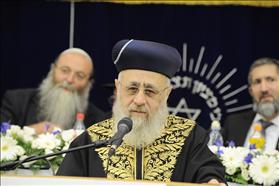The decisions of the Chief Rabbis have tremendous implications and influence
Hiddush blocks Chief Rabbi's conflict of interest
This week, Hiddush received a statement from the Office of the Attorney General, confirming that our request had been received and that detailed instructions had been given to the Chief Rabbi of Israel, Rabbi Yitzchak Yosef, regarding the official restrictions imposed upon him in his handling of kashrut issues due to a conflict of interest.
02/08/2018 13:26
Tags: Yitzhak Yosef · Kashrut

Chief Rabbi Yitzhak Yosef, source: Wikipedia
Given that one of the largest kashrut businesses in Israel is owned by the family of Chief Rabbi Yosef [The Badatz Beit Yosef], it is hard to believe that to this day neither the authorities nor Chief Rabbi Yosef have felt a need to prepare a conflict of interests arrangement. Chief Rabbi Yosef is the highest ranking kashrut supervisor in Israel, and his decisions and policies have far-reaching implications for the economic interests of his family's business, which is operated by his brother.
Hiddush appealed to the Attorney General several months ago, and just this week, two days after Chief Rabbi Yosef took office as head of the Chief Rabbinate Council [In the middle of the term of office, the two Chief Rabbis switch between two roles: President of the Supreme Court of Appeals and Head of the Chief Rabbinate Council], this opinion was given and the guidelines to bind the Chief Rabbi were set. The document is long and detailed. It basically prohibits the Chief Rabbi from dealing with any subject that has ramifications for Beit Yosef or private rabbinic courts that certify kashrut in general, with the exception of marginal and relatively unimportant matters. Legal mechanisms were established and a special committee was set up to supervise activities on kashrut matters in order to ensure that they would not be tainted by conflicts of interest.
It is clear that the very existence of monopolistic authority in the realm of religion invites conflict of interests.
In a second petition to the Attorney General, Hiddush wondered whether this was the best solution, and to what extent there is a need to cover broader conflicts of interests concerning the two Chief Rabbis - given the broad authority they enjoy, and given that they both have relatives who serve as judges on rabbinic courts, rabbis of cities, rabbis of neighborhoods, directors of various institutions, etc... The decisions of the Chief Rabbis have tremendous implications and influence.
It is clear that the very existence of monopolistic authority in the realm of religion invites conflict of interests. It would be preferable if Israel had no state-empowered religious authority and all matters of religion were regulated voluntarily, without interference and without granting of governmental powers to particular religious groups and rabbinic figures. A recent example of a mishap that is the poisonous fruits of the present reality is the conviction of the brother of Chief Rabbi Yitzchak Yosef, Rabbi Avraham Yosef, on criminal charges related to the abuse of his authority as Chief Rabbi of Holon [A position from which he was forced to resign following his conviction]. He had used his position of power to pressure business owners in the city's food sector to purchase food products under the supervision of Badatz Yosef, which was established by their father, Rabbi Ovadia Yosef, and owned by the family.
Hiddush will monitor the implementation of the conflict of interest arrangement and its related issues, and we will continue to fight ceaselessly to advance the values of the rule of law and of freedom of religion and equality.